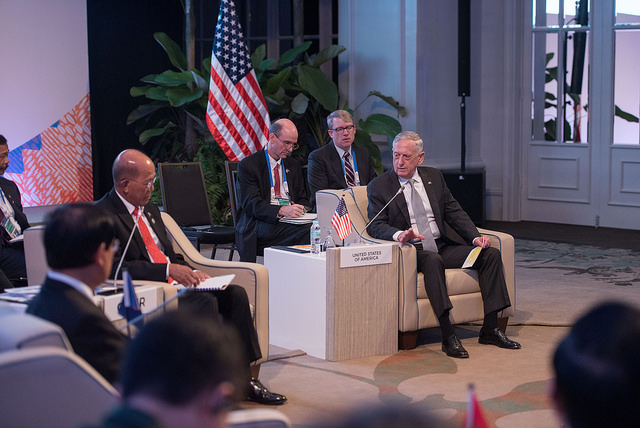In talks held between senior defense officials from Japan, South Korea and the United States on Monday, it wasn’t American Defense Secretary James Mattis urging an escalation of defensive posture in the face of the North Korean threat, but rather his Japanese Counterpart.
Japanese Defense Minister Itsunori Onodera told officials from the two allied nations that the threat posed by Kim Jong un’s North Korean regime has reached a “critical and imminent level,” adding that the U.S. allied nations must address the situation.
“(The) threat posed by North Korea has grown to the unprecedented, critical and imminent level. Therefore, we have to take calibrated and different responses to meet with that level of threat,” he said, speaking through a translator, at the start of talks in the Philippines.
It comes as no surprise that the Japanese may associate North Korea as a more direct and dire concern than before, as Pyongyang has now repeatedly routed their long and medium range ballistic missile tests on trajectories that carried them over the Japanese islands. South Korea has been staring down the barrel of North Korean aggression for decades, resulting in a fairly disinterest response to North Korean bluster among many in the South Korean populous. The Japanese people, unsurprisingly, don’t take the threat of a nuclear strike on their soil lightly, however, leading them to assert their agreement for the U.S. policy saying that “all options” must be on the table.
South Korea’s defense minister, Song Young-moo, agreed with Onodera’s assessment of the situation, saying, “North Korea’s provocative behavior is becoming worse and worse,” before reporters were escorted out of the meeting room.
Mattis echoed his Japanese counterpart, but was more reserved in his delivery, saying that he spoke directly with Onodera on Sunday, where they discussed “maintaining stability and peace in support of the diplomats.”
The American Secretary of Defense’s statement could be seen as a contrast to statements recently made by the American President, Donald Trump, who has repeatedly indicated that diplomacy with North Korea is a futile endeavor. Despite those remarks, Secretary of State Rex Tillerson has continued to emphasize America’s preference for negotiation over warfare.
Last week, a North Korean official indicated that Kim Jong un would be unwilling to meet with American officials to discuss a deescalation of tensions between North Korea and the world at large, at least until they are certain that they possess the ability to strike American cities on the East Coast with a nuclear weapon. This development seemingly confirms the idea that Kim sees his nuclear arsenal as an important negotiating tool that he hopes will force North Korea’s interests into the global conversation.
Image courtesy of the Department of Defense
Already have an account? Sign In
Two ways to continue to read this article.
Subscribe
$1.99
every 4 weeks
- Unlimited access to all articles
- Support independent journalism
- Ad-free reading experience
Subscribe Now
Recurring Monthly. Cancel Anytime.











COMMENTS